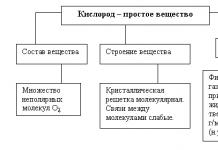Psychology and pedagogy
5 components of emotional intelligence
To actively and effectively develop emotional intelligence, you must first understand what this concept includes. In this material, we will analyze the five categories of emotional intelligence, identify specific skills that can and should be trained, and also provide clear examples of all this.Emotional intellect no less important for the harmonious development of a child than ordinary intelligence. Our future success depends largely on our ability to understand and control our feelings, read other people's signals and respond appropriately.
You know very well, based on examples school life and work, how important it is to determine your mood in time, control fear, anger, sadness, adequately communicate with others, and understand the feelings of students. But what exactly to develop? Enough has been said about emotional intelligence; for a complete picture, there are not enough specific examples from life and descriptions of skills.
Five Categories of Emotional Intelligence (EQ)
#1: Self-Awareness
This is the ability to recognize emotions, since they are the ones that “happen”, spill out into external world and are the basis of our psychological state. Developing self-awareness requires finding clues to your true feelings. If you can evaluate your emotions, name them, then you can manage them.Ninth-grader Christina suddenly burst into tears during a break between Russian and chemistry. Classmates are trying to understand what caused the sharp deterioration in their condition.
- Chris, are you sad? - Zhenya sighs sympathetically.
“I don’t know,” the girl sobs.
- Maybe something hurts you? - asks the realist Masha.
- No, nothing hurts me! - Christina snaps through tears.
- Well, what then?..
It may turn out that this feeling has nothing to do with sadness, but directly with fear. The girl feels very insecure in chemistry, this time she did not have time to prepare for the lesson at all, and now she is ashamed of the missed opportunity, she is afraid that they will ask her - she will embarrass herself in front of the class and the teacher, and it is a shame that everything turned out this way.
The methods of working with fear are completely different than with sadness. The ability to understand what exactly is wrong is the key to a successful fight against the causes of the phenomenon and their consequences.
Basic elements of self-awareness:
- Emotional awareness. Your ability to recognize your own emotions and their manifestations-effects. For example, if you are scared, your palms begin to sweat, your temperature rises before hysteria, if you feel insecure, you constantly wring your hands, and when you are close to breaking down and yelling at someone, frown your forehead and tense your cheekbones.
- Self confidence. Adequate self-esteem and understanding of your capabilities.
No. 2. Self-regulation
You are always in control of your emotions, even if it seems that you are not. No matter how strong the experience, you can prolong or shorten its duration using certain methods. Anger is “treated” by analyzing the situation, anxiety - by drawing up a plan, sadness - by reviewing the situation in a positive way, by taking a walk, or meditating.It would be worth teaching our students and children that fear of failure and displeasure cannot be dealt with with the usual “There is such a word MUST.” The order to pull yourself together does not solve the problem; it increases self-doubt.
It’s much more useful to sit down and discuss everything in the format of active listening (we wrote about this in one of ) and offer to draw up a plan. You have probably noticed yourself that having a sheet of paper with clearly written action points in front of your eyes, the fear of the task gradually recedes. Is your child afraid of exams? Make a plan to prepare for them. You don't know how to approach the report? Divide the task into many small ones. Manage your emotions and be honest with yourself, understand why it is important for YOU to do this work. Can't write an article? The main thing is to overcome the “fear of a blank sheet” - start writing down all the thoughts that come to your mind, draw up a structure for future material.
Basic elements of self-regulation:
- Self-control. Manage destructive impulses.
- Credibility. Maintain standards of honesty with yourself
- Integrity. Take responsibility for your own work.
- Adaptability. Become aware of emotional changes quickly and be flexible.
- Innovation. Be open to new ideas.
No. 3. Motivation
To motivate yourself to achieve any achievement, you need clear goals and a positive attitude towards the task. All people have different predispositions to perceive reality - more or less positive, but a positive attitude can and should be learned. If you discover and “take to work” negative thoughts as they arise, you can quickly reframe them in a more positive light, which will help you achieve your goals.- Mom, I don’t want to learn all this nonsense! - Kolya starts screaming and throws the notebook with definitions for social studies on the floor.
- What nonsense, son? - Mom asks, raising her eyebrows, but not the notebook.
- These are all the senates, councils, debits and credits...
“Then don’t teach,” Elena Leonidovna answers calmly, “if you don’t need them.”
“But they are needed...” Nikolai exhales protractedly.
- What are they for? - Mom asks supposedly incomprehensibly.
- Well, they are included in the tasks for the Unified State Exam, then, I want to go to university.
- Why go to university? - Mom reveals the idea.
- So that later I could work, as I wanted, as a lawyer, and defend people who are not guilty.
“It turns out that definitions are the beginning of the path, even already the middle, because you are such a good fellow and have already learned so much, the path to your dream, Kolya,” Elena Leonidovna smiles, “I’m not forcing you, just understand if you want it yourself.”
- Yes I want to.
If the student does not understand WHY he needs knowledge, he objectively will not be able to force himself to learn it, if there is no initial predisposition to study and absorb knowledge.
Main elements of motivation:
- Achievement. Your constant desire to improve or meet standards of excellence.
- Commitment. Alignment with the goals of the group or organization.
- Initiative. Prepare to act within your capabilities.
- Optimism. Pursue your goal despite setbacks and difficulties.
No. 4. Outward orientation (somewhat empathy)
The ability to recognize (not guess) how people are feeling and where they are is critical to success in life and career. The more you understand the feelings and signals of others, the better control you have over the signals you send.Pedagogical history, which will allow even primary schoolchildren to discuss the topic of verbal and non-verbal signals:
Once left alone at home, Zhenya decided to help her mother wash the dishes and accidentally broke her mother’s favorite cup. She felt very ashamed and felt sorry for her mother, Zhenya got upset and hid in the corner between the sofa and the closet. Mom came, saw the broken cup, began looking for Zhenya, and shouted: “You have no shame, no conscience, Zhenya! Not only did you break the cup, but you’re also hiding and avoiding answering.” Zhenya burst into tears here. And my mother became even more angry: “Oh, so you’re still crying, still feeling sorry for yourself?!”
What mistakes did mom make, and which did Zhenya?
Essential elements
- Outward orientation. If we are talking about adulthood, then this is the ability to understand customer expectations and respond to their needs.
- Helping others develop. You feel that other people should also move and strengthen their abilities.
- Diversity. You can help different open up new opportunities for people. Example: you, as a teacher, can work with both active and passive children, offering them material in a different shapes and communicating with them using different phrases and motivation.
- Social awareness. It is also called political awareness. You are able to read emotional currents and read “forces” within a group.
- Understanding others. The most clear point is the ability to track the feelings that lie behind the needs and desires of others. As in the case of Zhenya, who broke a cup and hid not out of fear and the desire to “hide from the scene of the crime,” but because of shame, but could not express it.
#5: Social Skills
Strong interpersonal skills equal success in life and career.Yes, we teach our children that the key to a great career in the future is high marks and good knowledge, but remember your surroundings: who is more successful - excellent students or C students? Sasha, who is everything school years spent time with textbooks and learned them inside and out, or Alyosha, who was always a “C” student, but had a real talent for negotiating with people, knew how to win them over and made great friends? There are both examples in my environment. And Alyosha is really happy and much more successful.
The point is that in modern world each of us has access to theoretical knowledge. There is no need to memorize absolutely all the dates in the Russian history course; you can always look them up on the Internet. A completely different conversation - understanding cause-and-effect relationships, development critical thinking and the ability to argue your point of view. Social skills become more important every year because in a global economy, you must have the ability to understand, empathize and negotiate if you don’t want to be left behind.
Most Important Social Skills
- Influence. Using effective persuasion tactics (
Emotional competence is important for people of any age and occupation. It allows you to better navigate life situations, determine native values, achieve goals.
- has a direct connection with the level of personal effectiveness. This skill is not given at birth, it is the result of hard work on yourself and your habits.
Content:
Concept of emotional intelligence The concept itself appeared at the end of the 20th century thanks to J. Meyer and P. Salovey, who defined it as awareness and management of one's own emotions , as well as the emotions of other people. This is one of the mental skills, among others. personal qualities
person. In a broad sense, this is the ability to process incoming information contained in emotions and take action based on the information received. It is an integral part general concept.

social intelligence
Main components Managing yourself and others can be thought of as a pyramid, with self-awareness at the foundation and ownership at the top. general situation , the ability to turn it in the right direction. Forward movement to the top and there personal qualities
personal growth
Self-awareness

Self-awareness is necessary to analyze your own emotions. You need to learn to identify the relationship between the manifestation of your moods and the consequences, how this or that behavior affects others. Understanding yourself is the first step to understanding others and the basis for managing yourself.
Emotions can be positive and negative. Our internal state directly influences the perception of the world around us, forming an appropriate way of thinking. We begin to act in accordance with our thoughts. By maintaining a high emotional background, you can easily and quickly resolve issues, charging those around you with positive energy. You also need to be able to work with negative feelings, process them and let them go, otherwise neglected negative thoughts can cause illness.
A special mindset helps you start moving towards your goals. Correctly established values do not require additional motivation; you are carried in the flow of events in the right direction. When difficulties arise, self-control is necessary, the ability to deny oneself momentary pleasures for the sake of big goal. The formula “Bad now, good later” will not allow you to deviate from the plan. If the goals are similar, self-discipline is needed more than motivation. Thus develops will to action.
Recognizing the emotions of others
Those who know how to control themselves and have the desire to act gain access to the next stage - the ability to capture social signals that carry information about the mood and experiences of the people around them. Knowing his weaknesses and how to overcome them, a person subtly senses the moods of others. One of the indicators general level intelligence - the ability to recognize the emotional state of an interlocutor. In this case, you can choose a model of behavior and take the situation into your own hands.
- recognition of the emotions of others + the will to act = situation management
Relationship management
Through work on oneself they are born leadership skills. At the peak of emotional awareness comes an understanding of the laws of human relationships. Self-confident, calm, insightful, strong-willed - all these are characteristics of a strong leader. Every leader is obliged to continue self-development in the field of emotional intelligence, applying new knowledge in practice. Otherwise, he risks falling under the influence of a stronger personality and losing the threads of control. A revolution can occur both within the group he leads, and through absorption from the outside.

The pace of life is constantly accelerating, the frequency and intensity of workloads is increasing. nervous system. Anxiety, sadness, helplessness, stress reactions - all these negative symptoms are the result low level emotional culture. The number of people who show rejection is increasing self, misunderstanding and rejection of others.
If you are not satisfied with something in others, it is easier to change your own attitude towards the situation than to try to change everyone. Instead of making demands on others, you should first increase the demands on yourself. A good leader is an emotionally competent person. Effective team management is possible when you are at peace with yourself.
- The path to managing others lies through the ability to manage yourself
You can do it yourself develop emotional intelligence or sign up for special training. These should be mainly practical exercises in the sequence that we wrote about above. That is, start moving from understanding yourself and developing your will. Take part in team games, become a referee in a team sport, organize an event, find an opportunity to speak in front of an audience. it is a powerful tool for managing the attention and mood of others.
Emotional Intelligence Training is just as important as physical fitness. People tend to weaken their efforts by plunging into their comfort zone. In advanced stages, this leads to loss of self-confidence and decreased quality of life. You need to leave your comfort zone to reach a new level or return to your previous form. As in sports, you need to gain momentum gradually, gradually increasing the load. The focus should be on acquiring three groups of skills.

- EI = EN + KN + PN
I. Emotional Skills directed inward to one's personality:
- sentiment detection;
- expression of emotions;
- determining the intensity of emotions;
- owning one’s own and managing others’ fortunes;
- understanding when actions are based on emotional impulses;
- ability to control impulses;
- the ability to direct emotions to achieve certain goals, refraining from momentary pleasures.
II. Cognitive skills give an idea of yourself in the world around you:
- awareness of the present moment, thoughts about the past and future are appropriate only when there is benefit to it;
- the ability to set goals, anticipate consequences and search for alternative paths;
- mastering behavioral norms;
- respect for other people's opinions and different points of view;
- directing thoughts towards solving problems, excluding empty experiences;
- establishing one's role in society;
- a positive attitude towards yourself, life and others.
III. Behavioral skills are aimed at performing actions in the outside world:
- the ability to behave with restraint in any situation;
- improving speech skills;
- internal self-control of the body to avoid unconscious movements;
- holding healthy image life.

It is believed that in business you cannot rely on emotions and they should not influence the result. However, in reality emotional interaction in business is very important because it allows you to develop effective decisions and ensure their implementation.
It is necessary to correctly distinguish between concepts emotional intelligence and emotionality. The latter reveals itself in a non-standard manifestation of moods, which has a bright and eccentric character. High intensity of emotions becomes an obstacle to making informed decisions; they cannot be controlled, so they are harmful common cause. Emotions of moderate intensity contain a large amount of useful information.
Mood changes are common to all people without exception, and often determine their behavior. Nobel Prize in economics in 2002 received by Daniel Kahneman. He proved that emotional factors influence the adoption of important economic decisions.
The connection between leadership and emotional intelligence

In every community there is a person who strives to take a leading position. Success is achieved by those who have developed emotional intelligence. This is not always the most well-read representative of the team, but the one who is actually not afraid to take responsibility for himself and others. It is the combination of practical skills and the will to action that determine success.
- a strong leader is an emotionally mature person
A high level of emotional intelligence eliminates empty fears and doubts, makes other people’s motives clear, and allows you to establish effective interaction with others. The ability to surround yourself with professionals is much more expedient than doing everything yourself. A strong leader knows how to set clear goals and has high degree self-actualization, self-confidence, knows how to admit his mistakes and mistakes. In other words, he is able to show emotional maturity.
Examples of success in developing emotional competence

Emotional intelligence has been talked about for a long time, but not all countries pay equal attention to it. In the West, it is taught in schools and institutes as the basis for success in employment and personal life. MBA programs emphasize emotion management and leadership.
Foreign example
American Express encountered enormous resistance when introducing a new Life Insurance product to the market. Negative attitude was observed among both clients and employees, because this service suggested thoughts of death. The aggressive sales style did not work; it was necessary to urgently take effective measures. Then American Express sent all employees to training in development of emotional intelligence. As a result, sales increased sharply.
Domestic example
In Russia, the concept is not so popular, but recently it has become viewed with increased interest. More and more companies are intentionally promoting the development of the emotional intelligence of their employees. Good examples are the companies SIBUR and Sberbank. This skill has a good response in the manufacturing sector, where the results of implementations are visible almost immediately.
Many people have talent, intelligence and intelligence, but this does not make them wealthy. They are often one step (knowledge) away from full-fledged success. Perhaps this is a lack of emotional intelligence for you?
Emotional intelligence (EQ) is the ability to identify, use, understand and manage one's own emotions in a positive way, for example to relieve stress, overcome difficulties and defuse conflicts. This ability also allows you to recognize the emotional state of other people.
Emotional intelligence can be improved at any time in life.
However, there is a big difference between studying emotional intelligence and applying it in practice. You may know you need to take certain steps, but that doesn't mean you'll take them, especially if you're under stress. In order to change your behavioral habits, you need to learn to cope with.
Emotional intelligence generally consists of five components:
- Self-knowledge. You acknowledge your own emotions and understand how they influence your thoughts and behavior. You know your strengths and weaknesses, you have confidence in your own abilities.
- Self-control. You know how to control impulsive feelings, manage your emotions in relationships, take initiative, follow through on commitments, and adapt to changing circumstances.
- Empathy. Do you know how to develop and maintain a good relationship, easily communicate, inspire and guide other people.
- Motivation. You imagine your goal and clearly understand each next step towards your dream.
- Social skills. You can understand the emotions, needs and problems of other people, recognize non-verbal cues, feel comfortable in society, determine a person’s status in a group or organization, and resolve conflicts within a team.
Why emotional intelligence is so important
Life shows that it is not always smart people achieve success and high social status. Surely you remember a couple of people who have excellent academic knowledge, but at the same time are socially incompetent both at work and in their personal lives.
A high IQ does not guarantee success in your career and family. Yes, he will help you get into a prestigious educational institution, but only emotional intelligence will help you when you need to calm down your emotions before final exams. In tandem, IQ and EQ reinforce each other.
Thus, emotional intelligence affects:
- School performance and productivity at work. Emotional intelligence can help you navigate complex situations. social connections in the workplace, become a leader and motivate others, succeed in your career. Many companies evaluate the emotional intelligence of candidates during an interview, considering it to be at least important characteristic than professional competencies.
- Physical health. If you can't manage your emotions, you probably can't manage stress. This may lead to serious problems with health. Uncontrolled stress increases blood pressure, suppresses immune system, increases the risk of heart attack, promotes infertility and accelerates aging.
- Mental condition. Uncontrolled emotions and stress affect mental health, making us vulnerable to anxiety and depression. If you don't manage your own emotions, you won't be able to build strong relationships. As a result, a feeling of loneliness and isolation will come.
- Relationship. By understanding and managing your own emotions, you will learn to express yourself and feel those around you. This will allow you to communicate more effectively and build trust.
What will help you develop emotional intelligence?
1. Self-knowledge
Psychologists argue that current experiences are a reflection of earlier emotional experiences. This means that your ability to perceive anger, sadness, fear and joy is likely dependent on the quality and intensity of the emotions in your body. early stages life.
If you have valued and understood your emotions in the past, they will become valuable assets in the future. If the experience was painful and confusing, you will probably do everything possible to distance yourself from it. However, you should not distance yourself even from negative feelings, because acceptance and awareness of your emotional state is the key to understanding how experiences affect your thoughts and actions.
Ask yourself a few questions:
- Are the emotions accompanied by physical sensations in the stomach, throat, or chest?
- Have you ever experienced feelings that were clearly reflected in your facial expressions?
- Can you experience strong feelings that completely absorb your attention and the attention of others?
- Do you monitor your emotions when making decisions?
If there is even one negative answer, your emotions are suppressed or turned off. In order to have healthy emotional intelligence, you must open up to your experiences and let them into your comfort zone.
sorsillo/Depositphotos.comHere are the surest ways to improve self-knowledge:
- Practice mindfulness. That is, deliberately focusing attention on the present moment. Mindfulness is often associated with Buddhism, but most of the world's religions practice something similar in the form of prayer. It relieves anxiety, calms and invigorates, and builds character.
- Keep a diary. At the end of each day, write down what happened to you, how you felt and how you dealt with difficulties. Periodically look back and analyze typical situations, note where you did not push or overdid it.
- Ask your loved ones who they see you as. Feedback from multiple people will reveal your strengths and weaknesses. Don't forget to record everything and look for patterns. The main thing is not to argue or object. It is important for you to look at yourself through someone else's eyes.
2. Self-control
Awareness of feelings is the first step to emotional management. You must use your emotions to make constructive decisions and behavior. When you become overly stressed, you may lose control and become less thoughtful.
Remember how easy it is to think rationally in a state of overstrain. Probably not. This happens because the brain withdraws from thought processes and switches to an overabundance of feelings.
Emotions are important pieces of information that tell us about ourselves and others. However, under stress, we become depressed and lose control of ourselves. Learn to cope with stress. This will help you control feelings and behavior, manage relationships, take initiative, follow through on commitments, and adapt to a changing world.
 Sericbvd/Depositphotos.com
Sericbvd/Depositphotos.com So how can you learn self-control? Surely you've heard about the old-fashioned method of counting to ten when you're angry.
It is not always possible to suppress anger or depression, however, a physical push will be appropriate. If you feel tired, do some exercises. If you can't muster the strength, slap yourself in the face. In general, use any physical impact, which will lead to a slight shock and break the vicious circle.
3. Empathy
We constantly focus on what is most important to us. However, our emotions are only half of the relationship. All other people have theirs too own feelings, desires, triggers and fears. Therefore, empathy is an extremely important life skill.
 bacho123456/Depositphotos.com
bacho123456/Depositphotos.com Try out a few tips to help you become an empath:
- Talk less, listen more. This Golden Rule any sincerely empathetic person. Of course, you cannot let the whole gamut of another person’s feelings pass through you, but you can try to hear him. Just let the person speak without interrupting him with your thoughts. This is difficult, especially if there are strong negative emotions. However, almost any connection will become stronger just because you ask before entering into a conversation.
- Accept the opposite opinion despite your own position. To understand what motivates a person, you need to be in his place. If you think your boss is being reckless, try to justify it in your head. Perhaps you would do the same if you were in his shoes.
- Understand the difference between saying “I know” and “I understand.” The first indicates that you allegedly had a similar life experience. The second indicates that you thought about the situation and played it on your own behalf. Of course, understanding other people's problems is a more trusting and truthful level of relationship.
Empathy involves your reaction, but it must come at the right time. If someone is about to burst into tears or is in deep pain, don't try to numb the feelings. The person needs to express his emotions, and he will need your help.
4. Motivation
When we talk about motivation as a component of emotional intelligence, we mean an internal core, not psychological forces to lift your body out of bed. As psychologists say, our core is located in the prefrontal cortex of the brain. She begins to be active at the mere thought of performing a significant task.
The goal can be a career, a family, a piece of art, or anything as long as it has significant meaning in your life. When motivation gets down to business, it combines with reality, and we take real actions. To start a family, motivated people start dating. To advance in their careers, motivated people undertake self-education.
 pertusinas/Depositphotos.com
pertusinas/Depositphotos.com How to find your core? First of all, you need to find out your own values. Many of us are so busy that we don’t have time to dig into ourselves and determine our priorities. It’s even worse if a person does work that directly contradicts his worldview and principles.
Secondly, you should transfer your goal to paper and write it down in detail. At the same time, it is necessary to understand that great success is greatly extended over time. It consists of small victories and the bitterness of defeats.
5. Social skills
Social skills are the ability to understand what people around you constantly address to you. These signals give a clear picture of what a person is experiencing and what is truly important to him. In order to accept nonverbal signals, you need to suspend your thoughts, not think about the goals and objectives that you are pursuing while being next to the person.
 racorn/Depositphotos.com
racorn/Depositphotos.com Social skills cannot work for you if you are thinking about something other than the current event. When we are immersed in memories or transported to the future, we are simply not in the present. This makes it difficult to pick up on subtle nonverbal cues.
Don't be under any illusions about multitasking. Yes, we can switch between topics very quickly, but in the transition we lose the subtle emotional shift that helps us understand other people.
Social skills are good to improve by resolving disagreements:
- Make time for each other and then return to the problem. In romantic relationships, it is necessary to remind your partner that behind criticism there is care and love.
- Make sure both parties are clear about the cause of the conflict. Offer a mutually beneficial solution that takes into account mutual desires and eliminates additional requirements.
- End on one note, even if it's not entirely positive. Let your boss, colleague or significant other know that you are moving in the same direction, albeit with different points of view.
Along with conflict resolution, you need to teach yourself to get to know each other, maintain a conversation, and play. At the same time, it is advisable to study in advance the mentality of people of different nations.
When the world first learned about emotional intelligence (EQ), this discovery played a role missing link in a number of studies: people with average IQ scores were several times superior to people with high scores in 70 percent of cases. This anomaly raised serious questions about the concepts that placed IQ as the main source of success.
Dozens of studies have shown that emotional intelligence is the critical factor that sets the best employees apart from the rest. This relationship is so strong that 90 percent of the best performers have high performance emotional intelligence.
“There is no doubt that emotional intelligence is a rarer skill than book intelligence, but my personal experience suggests that this skill is much more important on the path to becoming a leader. You just can't get past him." - Jack Welch
Emotional intelligence is something intangible that we all have. It influences how we manage our behavior, how we navigate complex social relationships, and how we make personal decisions to achieve positive outcomes.
As important as emotional intelligence is, its elusive nature makes it much more difficult to understand your personal EQ level and how you could improve it. You can always take a scientifically proven test, like the one that comes with the book Emotional Intelligence 2.0.
Unfortunately, high-quality (scientifically validated) EQ tests are not free. So I analyzed data from TalentSmart's study of over a million people to determine what behaviors are indicators of low emotional intelligence. And these are the types of behaviors you should eliminate from your repertoire immediately.
1. You get stressed easily
When you accumulate your feelings, they quickly build up into a dense feeling of tension, stress and despair. Unrealized emotions burden the mind and body. Your emotional intelligence skills help you avoid stressful situations, noticing them in time and trying not to bring conflicts to the limit.
People who do not know how to use their emotional intelligence tend to be unable to manage their own moods. They are twice as likely to experience despair, depression, use drugs and alcohol, and even contemplate suicide.
2. You have trouble asserting yourself.
People with high levels of emotional intelligence are able to balance good manners, empathy, kindness, and the ability to assert themselves and set boundaries. This tactical combination is the ideal way to deal with conflicts. When confronted, most people take a passive or aggressive stance. People with strong emotional intelligence maintain balance and control by filtering their emotional reactions. This allows them to neutralize difficult and toxic people without making them their own enemies.
3. You have a limited emotional vocabulary.
All people experience emotions, but only a few can clearly describe what exactly they feel. Our research showed that only 35 percent of people can do this, which is extremely critical because unvoiced emotions often lead to misunderstandings, which in turn leads to irrational choices and counterproductive actions. People with high levels of emotional intelligence manage their emotions because they understand them and they use a wide range of lexicon to describe your feelings. While many people describe themselves as simply feeling “bad,” people with strong emotional intelligence may indicate that they feel “irritated,” “frustrated,” “depressed,” or “anxious.” The more specific a word you can choose, the better you will convey what you are experiencing at the moment, what caused it, and how you can cope with it.
4. You make quick assumptions and defend zealously.
People with a lack of emotional intelligence are quick to form their own opinions and succumb to the onslaught of prejudices, which causes them to pay attention only to evidence that supports their point of view, and all other evidence is ignored. In most cases, they argue ad nauseum to get others to support their point of view. This type of thinking is especially dangerous for leaders when their ill-conceived ideas become the strategy for the entire team. People with high emotional intelligence think about their thoughts for a long time because they know that their initial opinion could be caused by emotions. They give themselves time to think carefully about an idea and determine its possible consequences. They then communicate their ideas to others effective way paying attention to other people's opinions.
5. You hold grudges.
Negative emotions that go hand in hand with grievances are, in fact, a reaction to stress. Just thinking about these situations puts your body into fight-or-flight mode, an ancient survival mechanism that gives you a choice: stand up and fight, or run far into the mountains to avoid problems. When a threat is imminent, this response is incredibly important for your survival, but when the threat becomes a thing of the past, resentment can wreak havoc on your body and cause negative consequences for your future health. Researchers at Emory University have shown that persistent stress leads to high blood pressure and heart problems. Holding grudges means you keep stress, which is why people with high emotional intelligence try to avoid it at all costs. Learning to let go of grievances not only makes you feel better, but also improves your health.
6. You don't let go of your mistakes.
People with developed emotional intelligence maintain distance between themselves and their mistakes, but do not forget about them. By keeping their mistakes at a safe distance so they can be recalled when needed, they maintain the ability to adapt and improve for future success. This skill requires high level self-awareness to walk the tightrope between obsessing and remembering. Dwelling on your mistakes for too long makes you anxious and self-conscious, but forgetting your mistakes means risking repeating them. The secret to maintaining balance lies in your ability to turn failure into an opportunity for improvement. This sets the stage for getting back on track every time you experience failure.
7. You often feel misunderstood
When you lack emotional intelligence, you have difficulty determining how other people understand you. You feel misunderstood because you are not communicating your message in a way that people can understand. Even with a lot of practice, people with strong emotional intelligence know that they don't always communicate their ideas perfectly. They notice when people don't understand their ideas, improve their approach, and then explain their ideas in a clearer way.
8. You are unaware of your own triggers.
Each person has their own “triggers” - situations and people that make them behave impulsively. People with developed emotional intelligence learn their triggers and use this knowledge to work around situations and people so as not to lash out at them.
9. You don't get angry
Emotional intelligence doesn't mean you always need to be nice; he says that you need to manage your own emotions in order to achieve the most best results. Sometimes this means showing people that you are upset, sad or disappointed. Constantly hiding your emotions under the guise of happiness and positivity is not a smart or productive choice. People with developed emotional intelligence show their negative and positive emotions, focusing on the situations in which they find themselves.
10. You blame other people for how you feel.
The source of emotions is within a person. There is a huge temptation to blame bad mood other people, but it is you who must take responsibility for your emotions. No one can force you to experience something you don't want to experience. A different opinion only drags you down.
11. You are easily offended
if you have clear understanding Because of who you are, it's quite difficult for other people to do or say anything to make you angry. People with developed emotional intelligence are self-confident and open to the world, which creates a fairly strong protective layer. YOU can even laugh at yourself or let other people laugh at you because in your own head you can draw the line between humor and degradation.
Summing up
Unlike IQ, your emotional intelligence is quite malleable. By constantly practicing new emotional behaviors, your brain builds the pathways in your head necessary to make those behaviors a habit. Along with constantly using these new behaviors, your brain breaks down connections to old behaviors. Soon you will begin to respond to others using your emotional intelligence, without even noticing it.
Travis Bradberry, entrepreneur.com. Translation: Artemy Kaydash
- Psychology: personality and business
Nowadays a lot is said and written about emotional intelligence. But when I conducted a survey among my friends on Facebook, it turned out that no one except my psychologist colleagues knew what emotional intelligence is.
This unusual term for us is closely related to the development of the emotional sphere. It is developed emotional intelligence that helps to cope with affective states.
What is an affective state?
This is a state in which we are so overwhelmed by emotions that we lose the ability to think, make decisions, respond adequately and creatively to the situation, and choose ways to respond. As a rule, from these states we slide into states that are most often ineffective. We cannot hear ourselves or others. We are, as they say, “carried.”
Are you familiar with this condition? Then you feel ashamed of your behavior and feel guilty.
When we cool down, we realize that we were inadequate. That it could have been done differently. In a state of passion, the strength of our reaction exceeds the danger of the situation in which we find ourselves.
This happens more often with women because we are more emotional.
Emotional intelligence includes four components:
- Ability be aware of your emotions and feelings.
- Ability to control them. This is not the same as managing. Control means we can cause this emotion, or we can prevent it from arising. In reality, we cannot control the occurrence of emotions. But we can do something when it occurs. Limit the force, redirect it in another direction.
- Recognizing emotions in other people ( empathy). Understand how the other person feels. Join him and share his emotions.
- Ability to build relationships with others. The emotional intelligence of a child and an adult is closely related to interpersonal relationships. Well-developed emotional intelligence allows a person to collaborate with others. Both in the professional sphere and in friendly, marital or child-parent relationships.
Emotional intelligence is needed where we interact with other people.
Expanded Model of Emotional Intelligence
I really like the expanded model proposed by psychologist Ruven Bar-On.

Ruven Bar-On's Model of Social and Emotional Intelligence
I think that after reading all the points, you will agree that the importance of emotional intelligence for a person is difficult to overestimate. You will probably want to make every effort to develop it both in yourself and in your children.
So, the extended model includes:
1. Self-esteem
That is, the ability to understand, accept oneself, recognize one’s value (importance). Know your strengths and weaknesses. And accept yourself with them. Do not devalue your desires and needs. Take care of yourself. This is basic self-acceptance, basic adequate self-esteem. Agree, we really need self-respect in life. We all want our children to grow up to be confident, self-respecting individuals.
2. Emotional awareness
This means that we are able to distinguish emotions at a particular moment in ourselves, understand the reasons for their occurrence, and, similarly, we see them in another person. We understand our own and other people's needs.
3. Assertiveness
This is the ability to openly express your opinion, defend your point of view, respecting yourself and your interlocutor. That is, it is open behavior that promotes self-expression. There is no fear of voicing your opinion, feelings and states.
4. Independence
It is the ability to rely on and trust yourself. Don't be emotionally dependent on others. Don't be afraid to be vulnerable and open. This is the prevention of all addictions. Prevention of codependent relationships, about which psychologists have been talking and writing a lot for a long time. Codependent people do not get married because, “I am a whole person and I am very happy to live with another person.” But because “I need someone else so much that I cannot exist without him.” Codependent relationships appear in adulthood.
 5. Empathy
5. Empathy
The ability to understand and share the feelings of another.
6. Social responsibility
This is the ability to engage in various social groups, cooperate constructively with others, show concern and take responsibility where necessary for other people. It's about family too. Ability to fulfill one's role in the family. To be a mother, to be a wife, to be a father.
7. Interpersonal relationships
Ability to communicate constructively, ability to establish relationships. Be in reasonably good emotional intimacy. The ability to feel and be in comfortable social contacts.
 8. Stress resistance
8. Stress resistance
Stress resistance is sometimes mistakenly understood as meaning that a person is not subject to stress at all. This is wrong. All people are subject to stress. This is how we are designed to react to stress. But people differ in their ability to recover from stress. It is very difficult for an adult to live if he does not know how to recover from stress, if he develops post-traumatic syndrome. That is, the event has already ended, we must move on with our lives, but the person still cannot get out of the stressful state.
I’m not talking now about global changes in life, about cataclysms. Every person has their own stress. It happens that people experience stress even from communication. And then they recover for a long time.
Another example. After an active day, I definitely need a day to recover. And there are people who need not a day, but a whole week or more. Stress accompanies our entire lives. The only question is what is stressful for a particular person. And this also depends on developed emotional intelligence. Abilities for self-awareness, reflection, self-regulation.
9. Controlling your emotions
The ability to experience your emotions without falling into affective states. Putting off pleasure to achieve a goal, refraining from temptation, achieving your goals, and so on. We learn how to cope with our affective states and direct them in a constructive direction at the 6-week anger training, which will start soon.
10. Validity assessment
The ability to compare your thoughts and feelings with external reality. We are always subjective in our judgments and feelings. And this ability to look beyond one’s subjectivity, to see a more or less whole picture, arises thanks to developed emotional intelligence.
11. Flexibility
This is the ability not to be rigid, to react differently in similar situations, to rebuild creatively, and not to be afraid of new things. As I always say, an adult is not a person who already knows how to react in all situations. This is the person who does not get lost in a situation unfamiliar to him. He continues to study and faces new challenges in life. And he is not afraid of these tasks, because he knows that he can cope with them, even if now he does not have a ready-made model or solution.
This concept also includes the ability to solve problems.
Sometimes people are very afraid of problems. Any problem unsettles them. As if there are beliefs that the problem is bad, they shouldn’t exist.
An adult is capable of solving various problems that he encounters in life. Because there is no life without problems, just like there is no life without stress.
 12. Optimism. Happiness and Prosperity
12. Optimism. Happiness and Prosperity
This is a model of emotional intelligence. Share in the comments what thoughts you have about these points.
For me, this is a model about a person growing up. Qualities of a mature person. I would like my children to be able to do all this, to have such abilities.
How's that for you? Note to yourself: what resonates with you? What would be good for you to develop in yourself?
Don't be too critical. If you survived, lived to your age, have a family and gave birth to children, then I think you have these qualities. You wouldn't be able to do it all otherwise. Perhaps you don't know yours strengths. It happens. We are used to thinking that we are missing something. But in fact, it is difficult for us to objectively evaluate ourselves. Most likely, you have gained a lot by becoming a wife and having children. This works especially well with children.
Next time we will look at individual areas of human emotional intelligence. I hope I have convinced you that developing emotional intelligence is useful?
In conclusion.
Emotional Intelligence and IQ
 I want us to separate two concepts: emotional intelligence and IQ (intelligence quotient). mental development, related to cognitive abilities).
I want us to separate two concepts: emotional intelligence and IQ (intelligence quotient). mental development, related to cognitive abilities).
Experts have shown that cognitive abilities, that same IQ, have nothing to do with emotional life. There is no correlation between high IQ and high emotional intelligence. Therefore, if a person’s emotional sphere and emotional intelligence are poorly developed or he is constantly in anxiety, does not know how to cope with his impulses, delay gratification, or overcome obstacles on the way to a goal, all this can lead to failure in life. And to low performance if we're talking about about the emotional intelligence of schoolchildren.
Even with good cognitive abilities When the academic mind is sufficiently developed, the emotional sphere may interfere with their use. Remember yourself in a state of anxiety, fear. Was it easy for you to make decisions?
The same thing happens with a child. When he is shamed and blamed, it is difficult for him to think. Living in anxiety, he cannot develop. Let's take care of such feelings as shame and guilt, they are given to us by nature. If you load them additionally, these feelings become toxic and intolerable for a person. And a person, growing up on shame and guilt, will not be able to develop either self-esteem or all the wonderful abilities inherent in him. What kind of self-actualization can we talk about here?


























